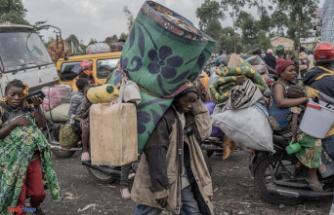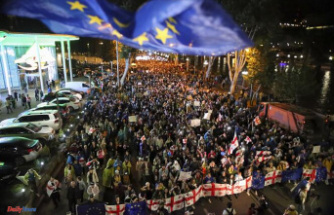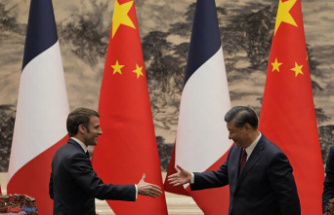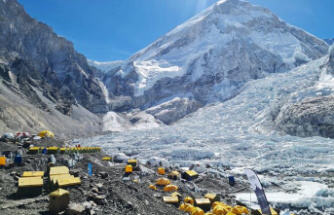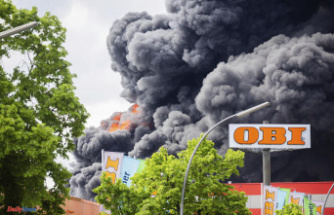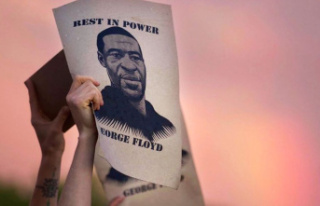"We didn't want to be caught up in the fighting, we risked being killed. So we fled and found ourselves stuck in the mountains, it was endless," Zahra, 35, who uses a surname, told AFP. loan for security reasons.
"We fell asleep thirsty and with empty stomachs. We woke up early in the morning and started walking again. We walked for 12 days", continues this mother of four children, aged five months to 12 years, whose village is found in the district of Balkhab, in the south of the province of Sar-e Pol.
With her husband and another family, she found refuge in a village mosque in Yakawlang district, in the neighboring province of Bamiyan.
She fled when a conflict broke out in Balkhab between the Taliban authorities and Mehdi Mujahid, one of the few members of the Shiite Hazara minority who became a commander in the ranks of the Taliban - mostly Sunnis Pashtun -, which he had joined in 2019.
When the Taliban seized power in Kabul in August 2021, he was appointed intelligence chief in the largely Hazara-populated province of Bamiyan.
The latter were persecuted for decades, in particular by the Taliban when they first came to power (1996-2001). They also continue to be the target of attacks by the jihadist group Islamic State, which calls them heretics.
The appointment of Mehdi Mujahid had been seen as an attempt by the Taliban to materialize their declared intention to be more inclusive. Promises that have remained largely empty, as the government is almost exclusively made up of Pashtuns.
But at the start of the year, the 30-year-old was dismissed from his post and came into conflict with his former sponsors. He then retreated with fighters to his native district of Balkhab, against which the Taliban launched an offensive at the end of June.
- Coal mines -
Religious sectarianism, ethnicity and the struggle for control of the Balkhab's coal resources: "All these factors contributed to the birth of the conflict," Australian-based analyst Nematullah Bizhan told AFP.
The Balkhab is home to several coal mines, the demand for which has soared in recent months, particularly in neighboring Pakistan, due to the energy crisis.
Local Taliban commanders had a reputation for "taxing" trucks going to Pakistan, as did members of the previous government. Mehdi Mujahid was fired for refusing to comply with Kabul's desire to curb this practice.
"The Balkhab also has a long history of resistance to the government," Bizhan added.
If the fighting only lasted a few days and if Mehdi Mujahid then took refuge in the mountains, at least 27,000 people, according to the UN, had to flee this arid and desert region, often accessible only on foot.
"We had nothing on us, we left with the clothes we were wearing, we had no food. We walked for four days, sometimes it was up to ten hours of walking," says Barat Ali Subhani, also hosted with his wife and their five children in the mosque near the town of Yakawlang.
"The following days, we had no more hope (...) We thought that we were all probably going to die", he adds.
In the locality of Duzdanchishma, near the district of Balkhab, the head of the health center treated several displaced people.
"Most were pregnant women because they (the displaced) had walked a lot in the mountains," Najiba Mirzae told AFP.
- "Summary executions", according to Amnesty -
According to her, "most of the women and children had respiratory problems, diarrhea, vomiting, because of the cold".
UN agencies distributed aid, but access to many displaced people, scattered in the mountains, remained difficult.
With drawn features and tanned skin, Noryalai leads a mobile Unicef team in Duzdanchishma. He surveys the region on foot in search of displaced persons.
He returns from an exhausting journey to a place where he thought he would find it. "Unfortunately, we couldn't get there: in one place, the donkeys couldn't pass" and we had to turn back, he laments.
While local media have reported deaths in each camp and among civilians, no reliable report is available.
At the end of June, Amnesty International said it was "gravely concerned by reports of summary executions and abuses inflicted on civilians". Charges rejected by Kabul.
"There is no more fighting. Mehdi Mujahid has fled to the mountains. We are looking for him," defense ministry spokesman Enayatullah Khwarizmi told AFP.
"We are told that the situation is normal, but we heard that after 8 p.m. the Taliban do not allow anyone to walk around. And if someone goes out or if the lights are on, they shoot," explains, however, on condition of anonymity, a displaced person crossed near Duzdanchishma.
"People are scared, that's why they are still in the mountains," he says.


